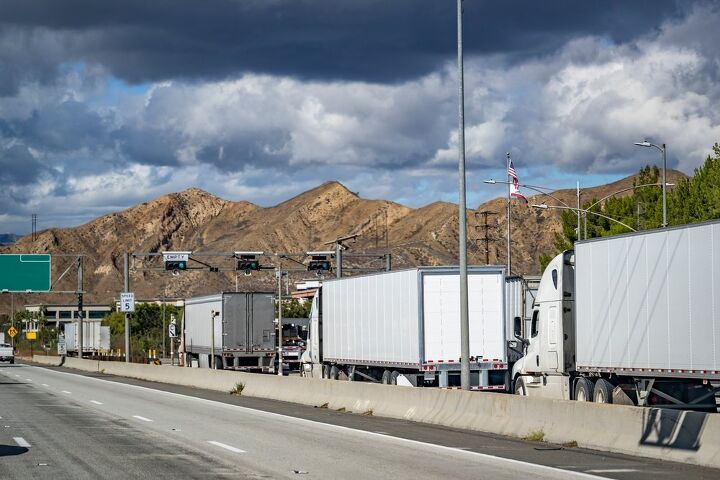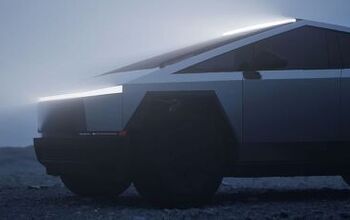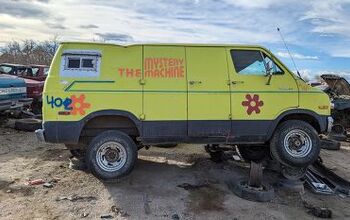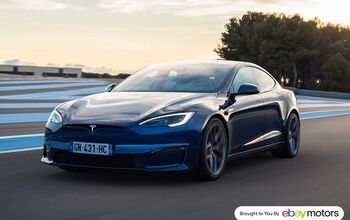California Moves Closer to Banning Heavy Diesel Truck Sales

Following new rules approved by local regulators on Friday, the State of California has inched closer to banning diesel semi trucks. The California Air Resource Board (CARB) board unanimously voted on a plan that would seek to phase out sales of medium and heavy-duty vehicles that are powered by diesel fuel by 2036.
The board says it’s targeting big rigs and heavier work vehicles because they represent 6 percent of all vehicles in California while making up 25 percent of the vehicle-related emissions. That’s likely because they do so much more driving and typically are loaded up with weighty items that need to be transported across the state — necessitating above-average fuel consumption.
CARB likewise claimed that this was the first such sales ban in the world targeting heavy vehicles. This makes sense since there’s really nothing to supplant them with right now. Battery technology isn’t really up to the challenge of overtaking long-haul trucking right now. However, California won’t be prohibiting their sale for at least another decade.
Democratic Gov. Gavin Newsom was quoted by the Associated Press as saying this would provide the state with an opportunity to show “the world what real climate action looks like.”
“We’re one step closer to achieving healthier neighborhoods and cleaner air for all Californians,” he said in a statement.
From AP:
The state continues to approve ambitious emissions standards as part of its broader goal of achieving carbon neutrality, meaning it would remove as many carbon emissions as it releases, by 2045. Air regulators previously voted to require that all new cars, pickup trucks and SUVs be electric or hydrogen by 2035. And they have banned the sale of new products run by small gas-powered engines, including leaf blowers, lawn mowers and portable generators.
The truck emissions vote follows the California Air Resources Board’s approval Thursday of a rule phasing out decades-old diesel locomotives and a transition to more zero-emission technology to power trains that transport food, lumber, oil and other products.
Truckers are less enthusiastic, however. The American Trucking Associations called the rule “unrealistic,” suggesting that the change would increase the price of electricity and shipping costs. In the end, the organization asserted that the change would mean all products would cost more. It likewise noted that vehicle emissions have been reduced across the board thanks to advances in combustion-engine technologies over the last few decades.
“As it becomes clear that California’s rhetoric is not being matched by technology, we hope the Board will reverse course and allow trucking companies the freedom to choose the clean technologies that work best for their operations,” the group said in a statement.
But it’s pretty hard to refute that diesel exhaust contains more particulate matter and that it ends up lingering in the air, increasing the potential risk of localized health complications. This is made worse by parts of California’s geography, which often traps smog along the coastline. Still, exchanging one problem with another is less than ideal and there’s not a clear pathway to make electrified big rigs wholly feasible at this juncture.
Despite the automotive sector showing off electric semis, they don't appear ready to supplant diesel trucks. Charging times would presumably delay deliveries and the added heft of batteries required for long-haul jobs has the potential to rip up the pavement in ways we've never seen before. Though it makes some sense that the state would want to dump vehicles with smoke stack exhausts that are pumping black shoot into the air.
Saying that the state voted on the scheme is slightly disingenuous, however. The populace had no direct say in the matter. Twelve CARB members are appointed by the governor and confirmed by the state Senate, with the other four being split into two groups. Two represent “environmental justice communities” (one appointed by the Senate and the other by the Assembly). The other two are non-voting members appointed for legislative oversight (and are appointed the same way).
But they don’t necessarily get to do what they want, even though CARB always seems to find a way. Technically, the bans have to be approved by the Environmental Protection Agency (EPA).
The new rules, called Advanced Clean Fleets (an extension of the Advanced Clean Trucks rules launched in 2020), will mandate fleets operating medium-duty vehicles (gross vehicle weight rating 8,501-14,000 pounds and heavy-duty vehicles (anything over 14,000 pounds) shift to zero-emission powertrains. But these fleets have different target dates for when their electrified transition has to be completed.
California already has incentives for all-electric vehicles (including buses) and will undoubtedly try to come up with subsidies to help swap heavy duty transports over to all-electric powertrains. This will be rationalized by claims regarding how ditching diesel will save billions of dollars in healthcare costs and similar assertions about how fleet managers can save money running EVs. But the latter item is counter to what the trucking industry is saying right now.
[Image: Vitpho/Shutterstock]
Become a TTAC insider. Get the latest news, features, TTAC takes, and everything else that gets to the truth about cars first by subscribing to our newsletter.

A staunch consumer advocate tracking industry trends and regulation. Before joining TTAC, Matt spent a decade working for marketing and research firms based in NYC. Clients included several of the world’s largest automakers, global tire brands, and aftermarket part suppliers. Dissatisfied with the corporate world and resentful of having to wear suits everyday, he pivoted to writing about cars. Since then, that man has become an ardent supporter of the right-to-repair movement, been interviewed on the auto industry by national radio broadcasts, driven more rental cars than anyone ever should, participated in amateur rallying events, and received the requisite minimum training as sanctioned by the SCCA. Handy with a wrench, Matt grew up surrounded by Detroit auto workers and managed to get a pizza delivery job before he was legally eligible. He later found himself driving box trucks through Manhattan, guaranteeing future sympathy for actual truckers. He continues to conduct research pertaining to the automotive sector as an independent contractor and has since moved back to his native Michigan, closer to where the cars are born. A contrarian, Matt claims to prefer understeer — stating that front and all-wheel drive vehicles cater best to his driving style.
More by Matt Posky
Latest Car Reviews
Read moreLatest Product Reviews
Read moreRecent Comments
- NJRide A question and a point:1) What were hybrids at compared to last year? And plug in bs a regular hybrid?2) How can state governments like mine possibly think 40 percent of sales will be electric in 3 years?
- Steve S. Steve was a car guy. In his younger years he owned a couple of European cars that drained his bank account but looked great and were fun to drive while doing it. This was not a problem when he was working at a good paying job at an aerospace company that supplied the likes of Boeing and Lockheed-Martin, but after he was laid off he had to work a number of crummy temp jobs in order to keep paying the rent, and after his high-mileage BMW was totaled in an accident, he took the insurance payout and decided to get something a little less high maintenance. But what to get? A Volkswagen? Maybe a Volvo? No, he knew that the parts for those were just as expensive and they had the same reputation for spending a lot of time in the shop as any other European make. Steve was sick and tired of driving down that road."Just give me four wheels and a seat," said Steve to himself. "I'll buy something cooler later when my work situation improves".His insurance company was about to stop paying for the rental car he was driving, so he had to make a decision in a hurry. He was not really a fan of domestics but he knew that they were generally reliable and were cheap to fix when they did break, so he decided to go to the nearest dealership and throw a dart at something.On the lot was a two year old Pontiac Sunfire. It had 38,000 miles on it and was clean inside and out. It looked reasonably sporty, and Steve knew that GM had been producing the J-car for so long that they pretty much worked the bugs out of it. After taking a test drive and deciding that the Ecotec engine made adequate power he made a deal. The insurance check paid for about half of it, and he financed the rest at a decent rate which he paid off within a year.Steve's luck took a turn for the better when he was offered a job working for the federal government. It had been months since he went on the government jobs website and threw darts at job listings, so he was surprised at the offer. It was far from his dream job, and it didn't pay a lot, but it was stable and had good benefits. It was the "four wheels and a seat" of jobs. "I can do this temporarily while I find a better job", he told himself.But the year 2007 saw the worst economic crash since the Great Depression. Millions of people were losing their jobs, the housing market was in a free fall, people were declaring bankruptcy left and right, and the temporary job began to look more and more permanent. Steve didn't like his job, and he hated his supervisors, but he considered himself lucky that he was working when so many people were not. And the federal government didn't lay people off.So he settled in for the long haul. That meant keeping the Sunfire. He didn't enjoy it, but he didn't hate it either, and it did everything he asked of it without complaint.Eventually he found a way to tolerate his job too, and he built seniority while paying off his debts. There was a certain feeling of comfort and satisfaction of being debt-free, and he even began to build some savings, which was increasingly important for someone now in their forties.Another bit of luck came a few years later when Steve's landlord decided to sell the house Steve was renting, at the bottom of the housing market, and offered it to Steve for what he had in it. Steve's house was small and cramped, and he didn't really like it, but thanks to his savings and good credit he became a homeowner in an up and coming neighborhood.Fourteen years later Steve was still working that temporary job, still living in that cramped little house that he now hated, and still drove the Sunfire because it wouldn't die. For years now he dreamed of making a change, but then the pandemic happened and threw the economy and life in general into chaos. Steve weathered the pandemic, kept his job when millions of people were losing theirs, and sheltered in place in that crummy little house, with Netflix, HBO, and a dozen other streaming services keeping him company, and drove to and from work in the Sunfire because it was four wheels and a seat and that's all he needed for now.Steve's life was secure, but a kind of dullness had set in. He existed, but the fire went out; even when the pandemic ended and life returned to normal Steve's life went on as it had for years; an endless Groundhog Day of work, home, work, home. He never got his real-estate license or finished college and got his bachelor's, never got a better job, never used his passport to do some traveling in Europe. He lost interest in cars. "To think how much money I wasted on hot cars when I was younger", he said to himself. He never married and lost interest in dating. "No woman would want me anyway. I've gotten so dull and uninteresting that I even bore myself".Eventually the Sunfire began to give trouble. With 200,000 miles on the clock it was leaking oil, developing electrical gremlins, and wallow around on blown-out shocks. Steve wasn't hurting for money and thought about treating himself to a new car. "A BMW 3-series, maybe. Or maybe an Alfa Romeo Giulia!" He began to peruse the listings on Autotrader. "Maybe this is just what I need to pull out of this funk. Put a little fun back in my life. Yeah, and maybe go back to the gym, and who knows, start dating again and do some traveling while I'm still young enough to enjoy it!"Then his father passed away and left him a low-mileage Ford. Steve didn't like it or hate it, but it was four wheels and a seat, and that's all he needed right now."Is it too late to have a mid-life crisis?" Steve thought to himself. For what he needed more than that stable job, that house with an enviably small mortgage payment, and that reliable car was a good kick in the hindquarters. "What the hell am I afraid of? I should be afraid that things will never change!"But the depression was like a drug, a numbness that they call "dysthymia"; where you're neither here or there, alive or dead, happy or sad. It was a persistent overcast, a low ceiling that kept him grounded. The Sunfire sat in his driveway getting buried by the needles from his neighbor's overhanging pine trees which were planted right on the property line. "Those f---ing pine trees! That's another thing I hate about this damn house!" Eventually the Sunfire wouldn't start. "I don't blame you", he said to the car as he trudged past it to drive the Ford to another Groundhog Day at that miserable job.
- Yuda Cool. Cept we need oil and such products. Not just for fuel but other stuff as well. The world isn't exactly ready to move to wind and solar and whatever other bs, the technology simply isn't here yetNot to mention it's too friggin expensive, the equipment is still too niche and expensive as it stands
- Rna65689660 Picked up my wife’s 2024 Bronco Sport Bad Lands!
- Inside Looking Out Android too.


































Comments
Join the conversation
EV sales in 2021 were 3% globally. Easy to double sales when the numbers are low. First, the US electric grid is stressed now, adding EVs in the near term will push it over the edge. The grid will not have the capacity to cover the additional use. You must not live in the South? Second, over the lifespan of an EV (cradle to grave), they ARE MORE HARMFUL to the environment than ICE (proven fact). What is the plan for disposing of all the used toxic batteries every 10 years? Additionally, ICE shipping brings goods to this continent, ICE heavy trucking moves it throughout the nation. Have never seen an electric freighter or EV long-distance heavy truck. While Auto companies are investing in EV technology, they also invested in Diesel technology in the late 70's early 80's with little success to show for the investment. Fyi, Tesla (with govt aid) is only #7, Apple is #1 with the greedy oil companies filling in between!
"First, the US electric grid is stressed now, adding EVs in the near term will push it over the edge."
Very true, especially with nuclear being retired and not replaced. I think their plan is to build natural gas plants which is why State Media has attacked it of late (though part of that may be supplying LNG to Europe for the ongoing (and pointless) NATO/Soviet proxy war). In DC's view, removing natural gas access to citizens allows them to have more supply for electric grid expansion/export and gives them greater control for their American Dystopia project.
"Second, over the lifespan of an EV (cradle to grave), they ARE MORE HARMFUL to the environment than ICE (proven fact). What is the plan for disposing of all the used toxic batteries every 10 years?"
Two things:
"While Auto companies are investing in EV technology, they also invested in Diesel technology in the late 70's early 80's with little success to show for the investment."
This is a good point, though I'm not sure how much of it is voluntarily investment and how much is at gunpoint. On Diesel there may have been a Federal nudge but the industry leaped into it (and other tech) in response to the oil embargo(s) and concerns Peak Oil was nigh. I recall reading an interview where an exec said GM was forecasting $3.00/gal by 1985 (so $8-10+ in current Monopoly money). I would also argue Diesel could have worked in the 1980s but it was GM's missteps in the technology which soured things for the whole industry.